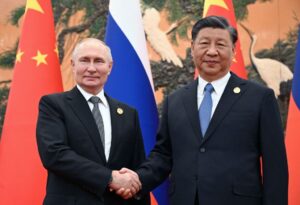“False and dangerous.” “Deeply concerning.” “A neo-Nazi-sympathising sociopath.” Many of Europe’s leaders may have been regretting their previous criticisms of Donald Trump. From Donald Tusk to David Lammy, the bloc’s liberals rushed to offer their stiff congratulations to the newly anointed President-elect. Meanwhile, the leaders of Italy and Hungary raced to kiss the ring of America’s godfather of populism.
Yet if there is one thing that unites Trump sycophants and sceptics in Europe, it’s the desire to boost European defence spending and security cooperation. In a nervy display of Franco-German solidarity, the leaders of France and Germany announced that they would work to build “a more united, stronger, more sovereign Europe in this context”, with an emphasis on enhancing European defence. In Britain, there have been calls for Prime Minister Keir Starmer to draw closer to Europe on security, deepening a Brexit betrayal initiated by Boris Johnson.
For liberals, strengthening the EU and Nato will insure against Trump either withdrawing from the defence alignment — whose European members he views as parasitical free-riders — or giving up on the Ukraine war effort. For populists, greater defence spending is an act of fealty, symbolising their devotion to Trump’s new world order.
Either way, Europeans would be mistaken to respond to Trump 2.0 by doubling down either on the transatlantic alliance or European integration. What Trump’s victory shows is that the globalist strategy of pursuing transnational integration against the wishes of voters has failed. With his America First agenda, the President-elect has now bet twice on America’s voters over its globalist elites — and won both times. In light of this, Europe’s leaders would commit a grave error in choosing Nato over their own people.
There was once a time when European economic and security integration may have had a strategic rationale: in the post-Cold War unipolar world, globalisation was underpinned by American hegemony and economic strength. Back then, American globalism provided the cover for European integration, allowing Europe’s elites to detach themselves from their voters. Workers were promised all the glories of globalisation in return for retreating from politics into lives of cosy consumption. This process opened up the void between citizens and political elites that has bedevilled European states ever since.
That world is now long gone. The high-tide of economic globalisation has receded, and political globalism is ebbing with it. Today, China is the industrial workshop of the world, and America is no longer its hegemon. This means that further European or transatlantic integration through Nato has become a losing strategy. Rather than uniting against Trump or sucking up to him, Europe should seek to replicate his domestic political model. As Trump did in the US, European nations should build electoral coalitions for national renewal, and use this as a basis to forge new international relationships in place of the old transnational ones.
There are plenty of reasons to avoid further European integration, whether it’s via the EU or Nato, but several stand out. First, Trump’s foreign policy focus will be on China and the Asia-Pacific more than Europe, which will increasingly take second place in Washington’s political calculations. No amount of Trump-whispering from Giorgia Meloni or Viktor Orbán will change that. Second, a push to further European integration in response to US strategic retreat from Europe will not strengthen the Continent. Quite the opposite: it will bolster the transnational structures that weaken the nations of Europe. The EU functions by leaching power from the nation-state without suborning it to any greater political authority. With no institutional core, the EU functions as a political pinball machine, ricocheting responsibility from one supranational agency to another, from one country to another.
This structure admittedly worked for a time, but only with the US hovering in the background. Throughout the era of unipolar globalisation, Washington was ready to come to the aid of European states when necessary: America offered leadership during European military campaigns against Yugoslavia in the Nineties and Libya in 2010, for instance, and oversaw the European financial crisis in the 2010s through the International Monetary Fund. Today, with Trump looking east, America will be less willing to lend a hand.
Nor will strengthening Nato be of much use in Trump World, as this will only reinforce Europe’s geopolitical divide — from which the US ultimately profits. Just consider the war in Ukraine. As long as the EU and Russia are at odds, the EU will remain dependent on importing more expensive US liquid natural gas, which will act as a drag on European industry and growth. Meanwhile, Russia will remain focused on supplying energy markets outside of Europe, relying ever more heavily on Chinese imports to supply its industrial equipment. That is a world that favours Chinese and American firms over European ones.
If Trump’s foreign policy follows the direction of his first administration, then we can expect a renewed focus on building a more transactional international order. Bilateral bargaining and regional orders are more likely than starry-eyed globalist compacts. To bargain effectively in such a world, European nations must develop a clear sense of their own national interests. And identifying those national interests means looking inward, not outward. This means turning away from the faded promises of globalism.
For this reason, renewed calls for transnational integration — whether of the European or Atlantic variety — miss the mark. The alarmed response of European liberals to Trump’s victory reveals a fear not only of Trump, but of their own voters. The reason they fear Trump is because they know that he has something they lack: national democratic legitimacy, built on the wishes of the marginalised and the politically excluded. Europe’s liberal elite feel trapped between a mercurial Trump and their own left-behind “deplorables”.
By contrast, Europe’s populists have embraced Trump as the leader of their global movement. Yet this is also ill-advised. Rather than turning to Washington for leadership, populist leaders would be better off learning from the Trump playbook: appealing to their fellow citizens rather than parading around with Nato banners or jockeying for international position. This is the paradox of Trump World: the only way to build a new era of international cooperation is to start from within, through a project of national renewal.
Disclaimer
Some of the posts we share are controversial and we do not necessarily agree with them in the whole extend. Sometimes we agree with the content or part of it but we do not agree with the narration or language. Nevertheless we find them somehow interesting, valuable and/or informative or we share them, because we strongly believe in freedom of speech, free press and journalism. We strongly encourage you to have a critical approach to all the content, do your own research and analysis to build your own opinion.
We would be glad to have your feedback.
Source: UnHerd Read the original article here: https://unherd.com/



